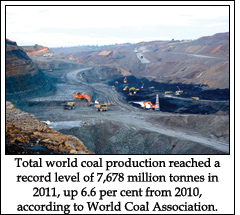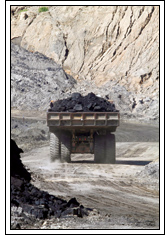
In mid-April, Central Electricity Regulatory Commission passed a landmark judgement allowing a “compensatory tariff package” to Tata Power for its 4,000-mw Mundra UMPP. The coastally-located project running on imported coal is managed by Coastal Gujarat Power Ltd, a wholly-owned subsidiary of Tata Power Company Ltd.
Empowered by this package, Tata Power has been allowed to sell power at a higher rate to offset the cost of imported coal. The Mundra UMPP is supplying power to seven state government-owned utilities spread over five states—Gujarat, Maharashtra, Rajasthan, Punjab and Haryana.
It may be recalled that Tata Power had clinched the Mundra UMPP in late 2006 by quoting a levelised tariff of Rs.2.26 per kwh over the 25-year concession period. It was also amongst the early instances of tariff-based competitive bidding (Case II) in the Indian power sector. The Mundra UMPP will be fuelled by coal imported from captive coal mines of Tata Power in Indonesia. Troubles surfaced in September 2011 when the Indonesian government implemented a policy where coal could not be exported at lower than market prices. This directive threw the tariff structure of Mundra UMPP out of gear as Tatas had quoted the said rate purely on the basis of their access to cheap imported coal.
Thanks to the CERC order, Tata Power can in principle sell power to the seven beneficiary power utilities at an upwardly revised rate. Tata Power had claimed fiscal losses of Rs.1,873 crore per year (or Rs.47,500 crore over the 25-year concession period) were it to sell power at the rate of Rs.2.26 formalized in the PPA. The current rates for new power projects vary from Rs.3.50 per kwh to Rs.7.00 per kwh, depending on the size of the power plant and the fuel source, among several other factors.
The Mundra UMPP is the second case where the developer of an imported coal-based power project has been allowed to revise tariffs to offset costlier fuel. On April 2, CERC offered similar relief to Adani Power for its 4,620-mw power project, incidentally also located in Mundra, Gujarat.
It may be understood here that the CERC relief package, in both the cases, is temporary. The extent of relief could change if the situation with respect to imported coal improves.
 The debate:
The debate: The CERC order, in the case of both Adani and Tata Power, has created much debate amongst industry players and analysts. Even within the CERC, the relief orders were not passed unanimously with one out of the four members dissenting. In allowing for revision in tariffs, CERC has rather directly impinged upon the sanctity of a power purchase agreement. When a power developer wins a project under tariff-based competitive bidding, the winning tariff needs to be safeguarded. Renegotiation of tariffs can defeat the very purpose of competitive bidding. While one must admit that the sudden cost escalation in imported coal is beyond the control of the developer, it is not unfair to expect that some contingency assumptions are made by the developer whilst submitting its tariff. It is unsafe on the part of the developer to assume that the project environment, especially when it comes to international policy, will remain inelastic for a period as long as 25 years—the longevity of a typical long-term power purchase agreement.
When revision in PPA-bound tariffs is allowed, the very selection of the developer now comes under shadow. Let us assume that a developer A that won a project based on tariff “x” is now allowed to upwardly revise the tariff to “y”. It could very well be the case that during the time of bidding there was a developer B that had quoted less than “y”. Developer B that did not win the project because its bid was inferior to the winning bid, now appears to be technically superior to Developer A. This puts forth a question: does renegotiation of tariffs tantamount to re-bidding?
Untitled Document
Top Ten Coal Producers* |
|
| Country |
mln tns |
|
| PR China |
3,471 |
|
| USA |
1,004 |
|
| India |
585 |
|
| Australia |
414 |
|
| Indonesia |
376 |
|
| Russia |
334 |
|
| South Africa |
253 |
|
| Germany |
189 |
|
| Poland |
139 |
|
| Kazaksthan |
117 |
|
| World Total |
7,678 |
|
| *Data for 2011 |
|
| Source: World Coal Association |
|
In the case of the Tata Power’s Mundra UMPP, the seven power utilities entered into PPAs at the given tariff. Any revision in tariff would mean reworking the agreements. These utilities entered into long-term agreements solely in view of the tariff. How can one be sure that the utilities are still interested in the agreement, now that the backbone of the agreement, which is the tariff, has changed? Legal experts suggest that these utilities are free to approach the CERC or the Appellate Tribunal of Electricity in this regard.
In all this, CERC’s relief package appears to be a logical step. It is not giving a free hand to developer to raise tariffs but only providing room for contextual cost escalation. It could also be the case that the international policy environment, which caused fuel cost increase in the first place, could change for the better perhaps reverting to the original scenario. The fiscal concessions could then be reworked or even rescinded.
In the case of the Mundra UMPP, the 4,000-mw power is ready for commercial generation. Operating it at a loss, only in a bid to adhere to PPP-bound tariffs, could bring in unwelcome commercial inefficiency in the power value chain. It could engender under-recoveries that are well accepted as the main reason behind the infamous financial morass that most state power utilities are today in.